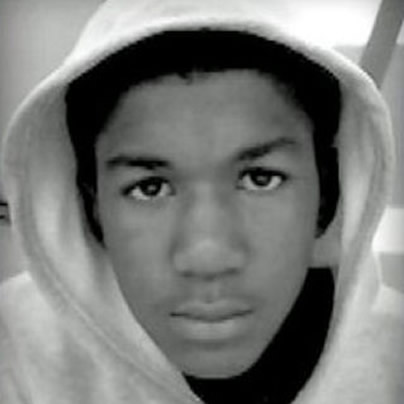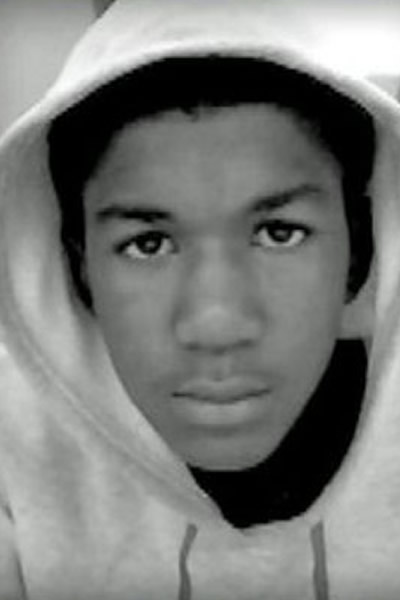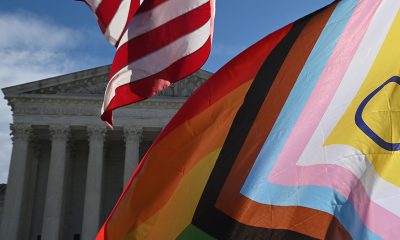Opinions
Racial discrimination still looms large
Trayvon verdict, voting rights ruling remind us of need for dialogue


George Zimmerman’s acquittal in the killing of Trayvon Martin has helped trigger a much-needed dialogue on race. (Photo released into the public domain by the family of Trayvon Martin)
Issues of racial discrimination and injustice are looming larger than they have in quite a while after a summer that has produced a “not guilty” verdict for George Zimmerman in the killing of unarmed Florida teenager Trayvon Martin; the dismantling of the pre-clearance provision of the Voting Rights Act, which required jurisdictions with a history of discrimination to pre-clear voting changes with the federal government; the ushering in of a higher standard of scrutiny when viewing college Affirmative Action policies; and racial slurs by culinary icon Paula Deen.
In May of this year, shortly after the D.C. At-Large Council race, I penned an article for the Blade titled, “D.C. election shows need for dialogue on race.” While many people were open to the substance of the article, several others became quite defensive and wanted to ignore the subject. Major publications in the area gave significant print space or airtime to those who were appalled that a Council candidate discussed the role of race in the election, after being posed a direct question on the subject. It didn’t matter that the candidate’s answer was an attempt to acknowledge “the concerns of some residents who fear that their needs may not be adequately addressed if they don’t have somewhat proportionate representation on the Council,” as I pointed out in my earlier article.
Rather than delve into those sentiments and attempt to understand why a significant portion of the electorate feels this way, mainstream publications chose to silence those of us who expressed a need for a dialogue on race and sought to explain those sentiments by denying us a platform to express our views and tarnishing a good Councilwoman’s name.
Now, in the aftermath of the Zimmerman verdict, the role that race plays in our country is starting to be discussed by individuals of all racial backgrounds, although many people still prefer to avoid the topic. Some of the people who attacked me for expressing the need for racial dialogue are now publicly championing the cause. It should not take a national tragedy (and yes, the killing of a promising child without recourse is a national tragedy) to raise an issue that many of us see every day and have publicly expressed, only to be met by comments that the election of Barack Obama as the first African-American president proves that we are now in “post-racial” times.
Whether it’s a young black man who gets pulled over for “driving while black,” a young black woman who gets followed around a trendy store, a black man who has people lock their doors when he walks by, an upwardly mobile black professional that gets his or her resume discarded when applying for a job with an ethnic name, or a black striver with solid credit who gets steered into a subprime mortgage when similarly situated white people are given traditional mortgages, many of us face this type of discrimination on a regular basis and don’t have the luxury to believe that race is not a factor in D.C. or in America.
These incidents color the lens from which we view the world and the lack of knowledge about the type of racism that African Americans face today, as well as having never faced these types of incidents first-hand, colors the lens from which other races view the world and the role that race plays in society.
This is important because when African Americans discuss race, we bring our collective experiences to the discussion. Thus, the sentiment not to discuss the subtext of race in a political campaign seems similar to the sentiment not to directly call Zimmerman’s suspicion of Trayvon Martin “racial profiling.” Not talking about the role race plays in a situation does not make it go away. Rather, it gives it a larger role in the minds of those who were not able to express their sentiments and have true dialogue on the issue. With notable racial disparities in income, health outcomes, safe communities, and access to quality K-12 education options, I am sure it will be fascinating to watch how everyone dances around topics of race in the upcoming mayoral race.
It was heartening to see 34 LGBT organizations sign onto a statement expressing solidarity with Trayvon Martin’s family and friends in the “fight for justice, civil rights and closure.” The line that stood out to me the most was, “[o]ur community has been targets of bigotry, bias, profiling and violence. We have expressed the heart-breaking despair of young people targeted for who they are, who they are presumed to be, or who they love.” I could not agree with this sentiment more. It is important for us all to recognize that all human rights struggles are related because only when everyone recognizes this relatedness will we see unprecedented progress in our collective quest for equality.
Rev. Martin Luther King, Jr.’s statement that, “Injustice anywhere is a threat to justice everywhere” still rings true today. Thus, we should all be outraged when a teenage boy cannot safely walk from the store to his father’s home without being stalked and killed. Similarly, we should all be outraged when a gay couple cannot walk down the street together, in some places, without being viciously assaulted. We cannot be content to celebrate the victories in the two Supreme Court marriage equality cases, without expressing outrage about the setbacks in the voting rights and affirmative action cases. Our quest for true equality depends on it.
Lateefah Williams is a writer, attorney and community activist in D.C. She is the immediate past president of the Gertrude Stein Democratic Club, the District’s largest LGBT political organization. Reach her at dcprogressivepotpourri.com or [email protected] or follow her @lateefahwms.

I recently lost my dog, Argo.
He was a pit bull, big, sweet, endlessly cuddly, and for 15 years he was my constant. The kind of presence you stop consciously noticing until they’re gone and the quiet hits you all at once. Pit bulls have a reputation. Argo never got the memo. He just loved people, completely and without condition, from the moment he met them until his last day.
I wasn’t prepared for what happened next.
My phone filled up. Instagram lit up. Texts came in from people I hadn’t heard from in months, in some cases years. Hugs from neighbors. Messages from colleagues. Condolences from people I’d lost touch with, some through nothing more than the slow drift of busy lives in a busy city, and some honestly through small tiffs and misunderstandings that neither of us ever bothered to resolve.
And sitting with all of that love pouring in, I found myself asking a question I wasn’t expecting: Why has it taken this long?
We do this in D.C. We get caught in our heads, our calendars, our ambitions. We let weeks turn into months. We let a small misunderstanding calcify into distance because nobody wants to be the first one to reach out, nobody wants to seem like they need something. We perform resilience so well that sometimes the people who care about us most don’t know we need them.
And then something breaks open, a loss, a moment of real vulnerability, and suddenly people show up. And you realize the connection was always there. It just needed permission.
Argo gave people permission. Even in dying, he did what he always did when he was alive. He brought people together.
I’ll be honest with you about where I’ve been lately. As I’ve climbed the entrepreneurial ladder, something quietly shifted. People stopped seeing Gerard. They started seeing a title, a resource, someone who could give them something or who owed them something. A character. Not a person. And when most of your day is spent inside other people’s problems and crises, you can start to feel it, a slow creep of cynicism that you don’t even notice until one day you realize you’ve gone numb.
And I’m not alone in that. Look around. We just watched innocent people die while those in power looked us in the face and called it something else. We watched people erupt over a 10-minute halftime performance like it was the greatest threat to our country. Everywhere you look there is something designed to make you angry, or exhausted, or both. Anger and numbness have become survival strategies. I understand it. I’ve lived it.
But here is what Argo reminded me.
The world is not what the loudest voices say it is. The world is what shows up when something real happens. And what showed up for me, after losing my sweet boy, was people. Caring, loving, present people who put down whatever they were doing to reach out to a friend. Some of them I hadn’t spoken to in too long. Some of them I’d had friction with. All of them showed up anyway.
That is the world. That is what it actually is underneath all the noise.
I think we’ve forgotten that. Or maybe we haven’t forgotten it, maybe we’re just so tired and overstimulated and battle-worn that we’ve stopped letting ourselves feel it. Because feeling it requires vulnerability, and vulnerability feels dangerous right now. It’s easier to scroll. It’s easier to stay mad. It’s easier to keep a wall up and call it wisdom.
Argo spent 15 years showing me a different way. He never met a stranger. He never held a grudge. He never saved his love for people who deserved it on paper. He just gave it, freely, every single time. Not a reward. Not a transaction. Just the most natural thing in the world.
Grief burns off everything that isn’t essential and leaves only what matters. What’s left for me is this: the world is full of good people. You may be surrounded by more of them than you know. And if you’ve gone numb, or angry, or so busy surviving that you’ve stopped connecting, I want you to know that the feeling can come back. It came back for me.
Reach out to someone today. Close a distance you’ve let grow. Tell someone they matter. Not because everything is perfect, but because connection is how we survive when it isn’t. Living disconnected, mad and closed off isn’t living at all. It’s a slower kind of dying.
Death came to teach me how to live. I hope this saves you some time.
Gerard Burley, also known as Coach G, is founder and CEO of Sweat DC.
Opinions
Why innovation matters for Black health
Making healthcare more affordable is vitally important

Black Americans are more likely than Americans of other races to live with chronic conditions like HIV. They also disproportionately struggle to afford the often expensive treatments needed to manage those conditions.
So it’s hardly surprising that Black voters care about politicians’ proposals to bring down healthcare costs more than any other group.
Most of those proposals — from leaders in both parties — are well-intentioned. But they are not all equally beneficial. Recent efforts to impose price controls on prescription drugs threaten to harm the very patients they are meant to help.
Consider former President Biden’s signature Inflation Reduction Act, which gave Medicare the power to set prices on brand-name medicines for chronic conditions like diabetes, autoimmune disease, or cancer — all diseases that Black patients disproportionately struggle with.
These price controls promise short-term cost savings. But they threaten to erase the much larger savings that patients with chronic illness would otherwise see over their lifetimes. That’s because price controls disincentivize companies from developing new medicines to compete against existing popular treatments for serious conditions.
Consider HIV. According to the CDC, more than 1.2 million people in the United States are living with HIV, and roughly 31,000 new infections still occur each year. In the 1980s, these diagnoses would have been a death sentence. Today, they represent a manageable chronic illness — a direct result of decades of sustained research and investment in antiretroviral development, long-acting injectables, and prevention tools like PrEP.
HIV treatments are cheaper and more accessible now than ever. That’s not because of government intervention, but because of the price wars that resulted as companies introduced competing therapies and battled for market share.
In fact, had the government prematurely intervened, those competing treatments might never have reached patients, who would still be stuck paying vastly higher prices.
That is precisely the risk our leaders are now taking. Many companies are already scaling back research because of the IRA’s price controls. Since the law’s passage in 2022, biotech firms have canceled at least 55 research programs.
That is especially dangerous for the Black community. Black patients have historically been overlooked by the research establishment, from the underrepresentation of Black participants in clinical trials to underinvestment in conditions like sickle cell disease that disproportionately affect Black patients. If companies are forced to scale back research, it is likely that treatments for smaller and more marginalized patient populations will face the greatest risks of being cut.
The Trump administration, meanwhile, continues to push for its so-called “Most Favored Nation” policy that would tie U.S. drug prices to the lower prices arbitrarily set by foreign governments.
The consequences could be severe. “Most Favored Nation” pricing would dramatically reduce companies’ revenues on both new and existing medicines, decimating resources for future research and development. Researchers project that, if imposed on Medicare and Medicaid alone, such policies could cut research spending nearly in half, leading to more than 200 fewer new medicines over the coming decade.
Developing treatments for HIV has historically required long timelines, complex trials, and sustained capital. Any policy that compresses revenues for breakthrough medicines must be evaluated not only for short-term savings, but also on its potential long-term effects on the pipeline that brings new survival and prevention advances to patients.
And there are also access risks. In countries that rely heavily on price controls, patients often face delayed and restricted access to drugs. Black communities in the United States already face barriers to consistent care and adherence to treatment. Importing foreign countries’ price controls would inevitably have ripple effects across our healthcare system, worsening these disparities.
Making healthcare more affordable is vitally important. Black families feel the pressure of rising costs every single day. But price controls carry severe tradeoffs. Breakthroughs in HIV treatment, long-acting prevention, cancer treatment, and chronic disease management rely on steady research — and if policymakers weaken the economic engine that drives that research, Black patients will feel the consequences first.
Health equity is not just about lowering today’s price tag. It is also about protecting tomorrow’s cures. Black communities deserve reforms that do both, not price controls that promise cost relief while sacrificing future breakthroughs.
Guy Anthony is president and CEO of Black, Gifted & Whole.

Republican representatives in the Kansas Legislature recently passed a bill that bans people from using restrooms in government buildings that do not align with their sex assigned at birth. The bills SB 224 and HB2426 initially focused on rewriting legislation surrounding driver’s licenses but after amendments, the bill would not only stop trans people from updating their gender on these driver’s licenses but force people to surrender their existing licenses. These bills also carry the most severe anti-trans bathrooms ban of any state.
According to Erin Reed for Erin In The Morning (EITM), “the measures would now even empower private citizens to act as bounty hunters — entering private business to search for transgender people in bathrooms and sue them for alleged violations.”
The bills would allow anyone to report any people who utilize any bathrooms that do not align with their gender assigned at birth. Anyone who believes that someone has entered a restroom not in alignment with their gender assigned at birth can complain and pursue $1,000 in damages. The first time that someone complains about a person using the “wrong” bathroom, that person can face a written warning for their first violation. The second violation would require them to pay a $1,000 fine, and with each additional violation, they could receive a misdemeanor resulting in another fine or up to six months in jail.
The Kansas Attorney General’s office is then responsible for determining whether the person has to pay the fine. Allowing people to police bathroom spaces is reminiscent of Florida’s bathroom law that allows transgender people to face criminal penalties, but even more dangerous, the bills extend this enforcement from “government-owned buildings” to private spaces.
Government entities that manage bathrooms and locker rooms at public schools and universities, highway rest areas, and public parks are now required to assign a gender designation to multi-occupancy private facilities or face a $25,000 fine for the first violation and a $125,000 fine for any additional violations.
There is a section, Reed notes, that creates a “private right of action,” making it the first law to penalize trans people directly for using the restroom and would extend bathroom bans into private spaces. “Without the option of single-person or family alternatives, this essentially forces trans people out of public life by denying us the right to even relieve ourselves or wash up,” Isaac Johnson of Trans Lawrence Coalition told EITM.
“Denying access to basic public amenities doesn’t just inconvenience people; it relegates them to second class citizenship,” Allison Chapman of Lawyers for Good Government told EITM.
The legislation flew through the Kansas Congress (and by using procedural maneuvers, Republican lawmakers ensured that there was no public input on the bill). The bill is now heading to the Kansas Gov. Laura Kelly’s desk for signature. Thankfully, Kelly, a Democrat who has consistently vetoed anti-trans legislation, vetoed it, but even so, it could be passed if Kansas Republicans get the support of two-thirds of lawmakers in both chambers.
The quick passage of these bills, and using the “gut-and-go” measure to ensure people had no opportunity to provide feedback after the bathroom elements were added, has drawn swift criticism.
The bills themselves have deeply unsettling historical parallels to slave catcher laws that allowed “bounty hunters” to track down and return escaped enslaved individuals to their enslavers for a cash reward. Federal laws, like the Fugitive Slave Acts of 1793 and 1850, enabled “bounty hunters” to operate even in free Northern states. These “bounty hunters,” also known as “slave catchers” or “kidnapping clubs” frequently kidnapped free Black people and sold them back into slavery, in what has been called the “Reverse Underground Railroad.”
Both of these acts provided little to no protection to free Black Americans; in fact, these acts aided and abetted this violence by incentivizing the kidnapping and sale of people of color into slavery. Even if free people had official “freedom papers,” many kidnappers destroyed these documents, and even free people of color typically could not testify in court. Free and previously enslaved Black children who had escaped to the North were especially vulnerable to “slave catchers” because they often did not know how to assert their rights.
In fact, ICE’s kidnapping of five-year-old Liam Conejo Ramos echoes this long history of child snatching in the U.S., from bounty hunters capturing and selling Black children into slavery.
This legislation also reeks of Texas Senate Bill 8 (SB 8), enacted in September 2021, that allowed private citizens to sue anyone who aids or performs an abortion after the detection of a fetal heartbeat, around six weeks of pregnancy. At the time, this was the most severe anti-abortion legislation on the books. It has remained there for five years, leading to a number of Rule 202 petitions that aim to collect more information that would provide a person who has violated SB 8.
Just this past month, the Texas Supreme Court heard oral arguments for Sadie Weldon v. The Lilith Fund, a case where a private Texas citizen sought to depose Neesha Davé, deputy director of the Lilith Fund, a nonprofit that supports people seeking abortions. The case will not rule on SB 8’s constitutionality but would open a path to challenge the law.
Bathrooms have long been a battleground to police people’s bodies, and this new Kansas soon-to-be law is no different. Think of segregation in the Jim Crow South between the 1890s and the mid-1960s when some White people acted as vigilantes ensuring that Black people remained out of “white-only” restrooms and other “white-only” spaces.
Just as Rep. Susan Hemphries, a Wichita-based Republican who brought the bill to the House floor said that the legislation is about the privacy for and safety of women, bathroom segregation was often justified by painting Black male sexuality as a threat to white women.
This even extended to the perceived threat of Black women in white women’s restrooms, with one group of white women in Detroit going on strike to protest the order prohibiting discrimination of people working in government and defense industries. These white women argued that they would contract syphilis from sharing toilet seats with Black women.
These new bills and all other anti-trans bathroom legislation, as many have argued, are the continuation of these racist bathroom restrictions.
There is deep historical precedence not only for policing public (and private) bathroom access but also enabling private citizens to act as bounty hunters. This form of bounty hunting threatens not just trans women but all women who anyone does not “assume” is cisgender who may be subject to legal complaints. As Orien Rummler reported for the 19th and them, anti-trans legislation and rulings threaten the rights of all women, especially cis women of color. And as science has long proved, gender is not binary–so it raises the question of how intersex people will be policed in these restrooms.
And by commodifying the bounty, it emboldens anti-trans violence, and misogynistic violence writ large, in the most intimate of public and private spaces.
Emma Cieslik is a museum worker and public historian.




















